Abstract
Antibody-based therapy of solid tumors has met with limited success, chiefly because solid tumors are relatively impermeable to macromolecules. This problem could be circumvented by attacking the readily accessible endothelial cells of the tumor vascular bed. We have developed a model to test this "vascular targeting" approach in which cytokine gene transfection of the tumor cells causes them to induce an experimental marker selectively on tumor vascular endothelium. An anti-tumor endothelial cell immunotoxin caused complete occlusion of the tumor vasculature and dramatic regressions of large solid tumors. By contrast, a conventional anti-tumor cell immunotoxin of equivalent in vitro potency produced only minor, transient antitumor effects but, when combined, the two immunotoxins induced permanent complete remissions in over half of the animals. These experiments indicate that immunotoxins directed against recently described markers on vascular endothelial cells in human tumors could provide a general treatment for solid tumors in humans.
Full text
PDF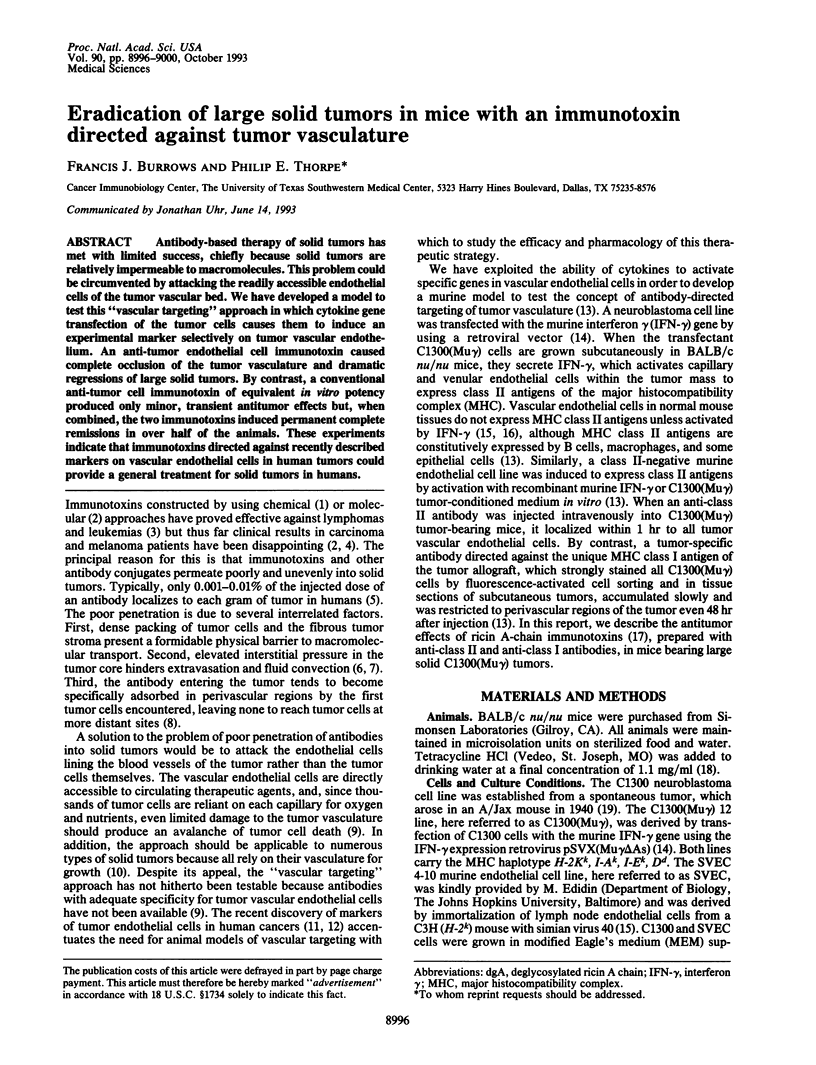
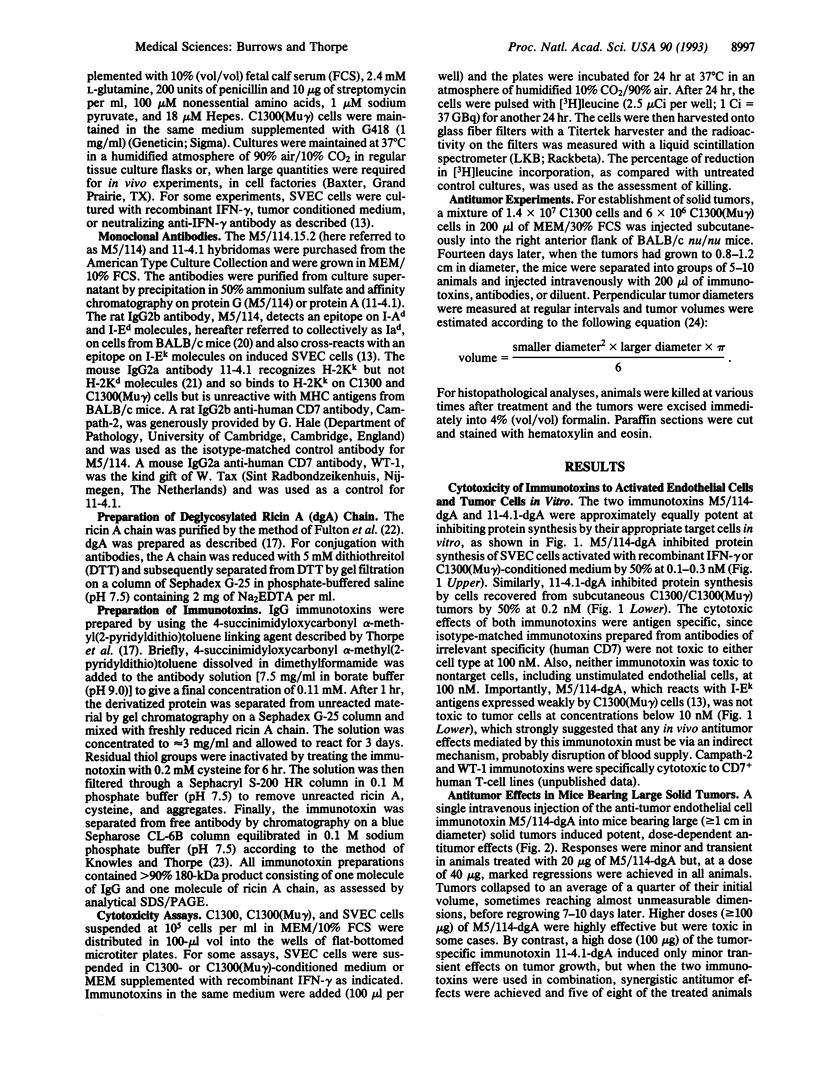
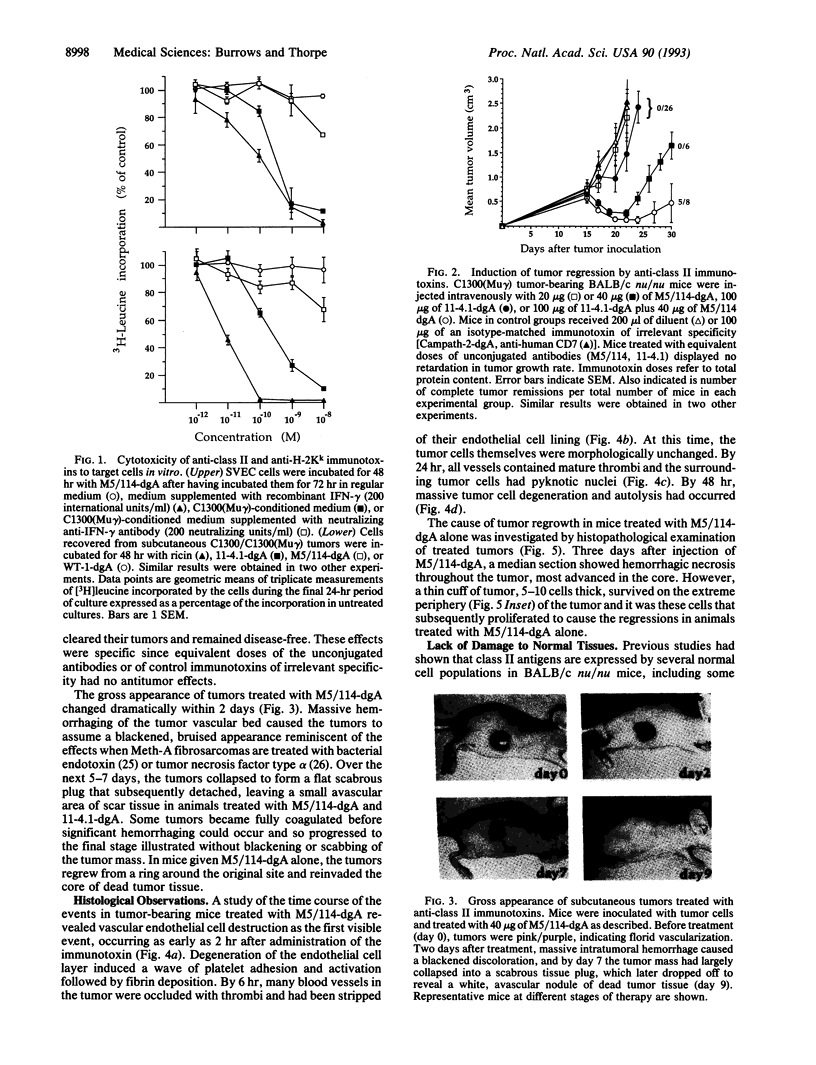
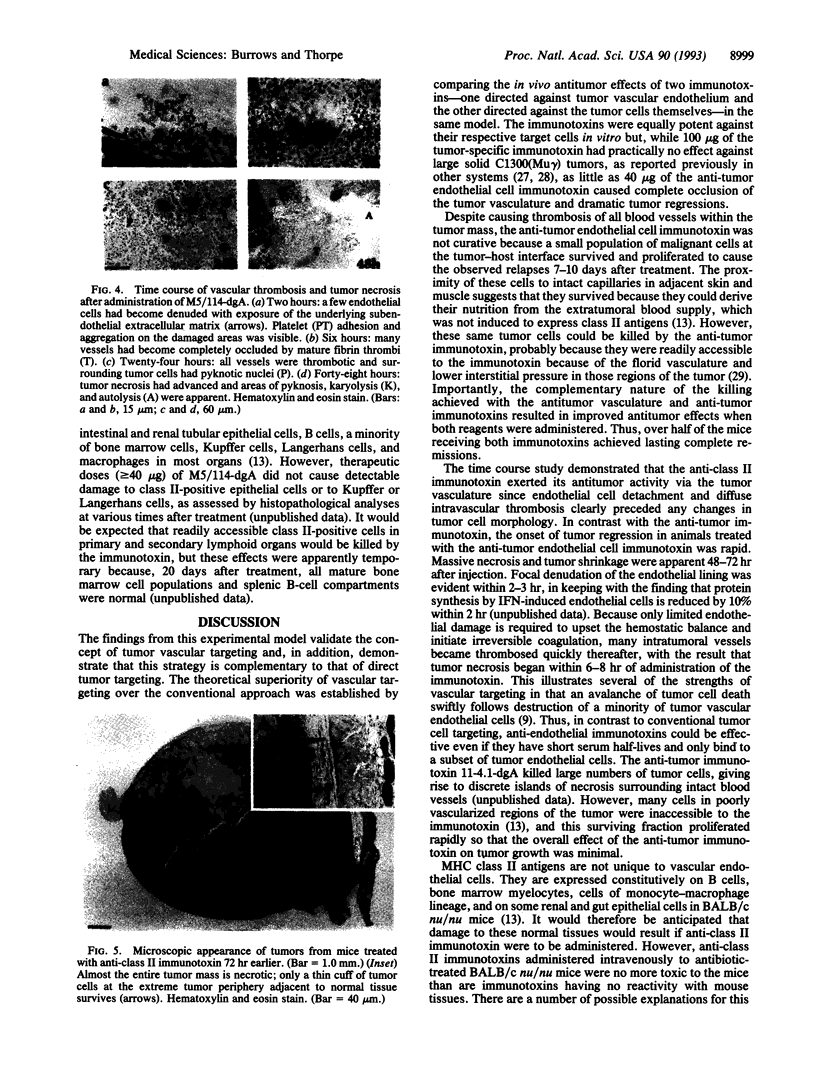
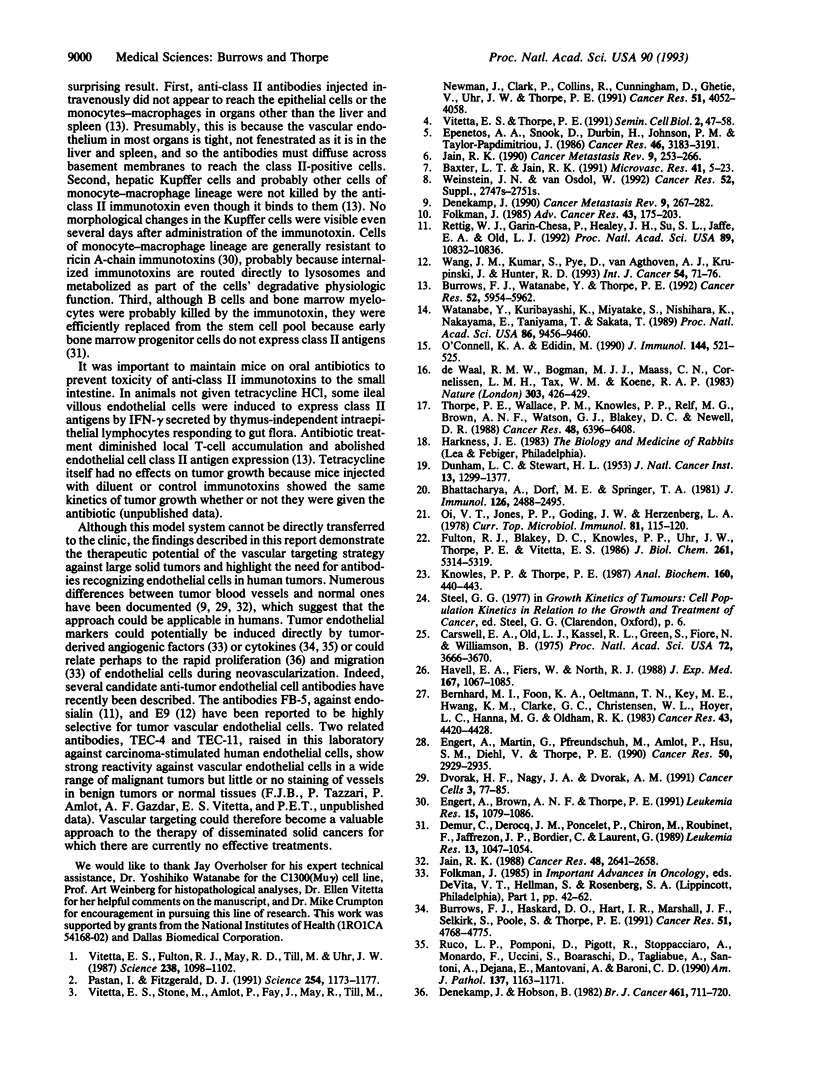
Images in this article
Selected References
These references are in PubMed. This may not be the complete list of references from this article.
- Baxter L. T., Jain R. K. Transport of fluid and macromolecules in tumors. III. Role of binding and metabolism. Microvasc Res. 1991 Jan;41(1):5–23. doi: 10.1016/0026-2862(91)90003-t. [DOI] [PubMed] [Google Scholar]
- Bernhard M. I., Foon K. A., Oeltmann T. N., Key M. E., Hwang K. M., Clarke G. C., Christensen W. L., Hoyer L. C., Hanna M. G., Jr, Oldham R. K. Guinea pig line 10 hepatocarcinoma model: characterization of monoclonal antibody and in vivo effect of unconjugated antibody and antibody conjugated to diphtheria toxin A chain. Cancer Res. 1983 Sep;43(9):4420–4428. [PubMed] [Google Scholar]
- Bhattacharya A., Dorf M. E., Springer T. A. A shared alloantigenic determinant on Ia antigens encoded by the I-A and I-E subregions: evidence for I region gene duplication. J Immunol. 1981 Dec;127(6):2488–2495. [PubMed] [Google Scholar]
- Burrows F. J., Haskard D. O., Hart I. R., Marshall J. F., Selkirk S., Poole S., Thorpe P. E. Influence of tumor-derived interleukin 1 on melanoma-endothelial cell interactions in vitro. Cancer Res. 1991 Sep 15;51(18):4768–4775. [PubMed] [Google Scholar]
- Burrows F. J., Watanabe Y., Thorpe P. E. A murine model for antibody-directed targeting of vascular endothelial cells in solid tumors. Cancer Res. 1992 Nov 1;52(21):5954–5962. [PubMed] [Google Scholar]
- Carswell E. A., Old L. J., Kassel R. L., Green S., Fiore N., Williamson B. An endotoxin-induced serum factor that causes necrosis of tumors. Proc Natl Acad Sci U S A. 1975 Sep;72(9):3666–3670. doi: 10.1073/pnas.72.9.3666. [DOI] [PMC free article] [PubMed] [Google Scholar]
- DUNHAM L. J., STEWART H. L. A survey of transplantable and transmissible animal tumors. J Natl Cancer Inst. 1953 Apr;13(5):1299–1377. [PubMed] [Google Scholar]
- Demur C., Derocq J. M., Poncelet P., Chiron M., Roubinet F., Jaffrezou J. P., Bordier C., Laurent G. Effects of an anti HLA-DR immunotoxin on leukaemia cells and hematopoietic progenitors. Leuk Res. 1989;13(12):1047–1054. doi: 10.1016/0145-2126(89)90149-5. [DOI] [PubMed] [Google Scholar]
- Denekamp J., Hobson B. Endothelial-cell proliferation in experimental tumours. Br J Cancer. 1982 Nov;46(5):711–720. doi: 10.1038/bjc.1982.263. [DOI] [PMC free article] [PubMed] [Google Scholar]
- Denekamp J. Vascular attack as a therapeutic strategy for cancer. Cancer Metastasis Rev. 1990 Nov;9(3):267–282. doi: 10.1007/BF00046365. [DOI] [PubMed] [Google Scholar]
- Dvorak H. F., Nagy J. A., Dvorak A. M. Structure of solid tumors and their vasculature: implications for therapy with monoclonal antibodies. Cancer Cells. 1991 Mar;3(3):77–85. [PubMed] [Google Scholar]
- Engert A., Brown A., Thorpe P. Resistance of myeloid leukaemia cell lines to ricin A-chain immunotoxins. Leuk Res. 1991;15(11):1079–1086. doi: 10.1016/0145-2126(91)90115-a. [DOI] [PubMed] [Google Scholar]
- Engert A., Martin G., Pfreundschuh M., Amlot P., Hsu S. M., Diehl V., Thorpe P. Antitumor effects of ricin A chain immunotoxins prepared from intact antibodies and Fab' fragments on solid human Hodgkin's disease tumors in mice. Cancer Res. 1990 May 15;50(10):2929–2935. [PubMed] [Google Scholar]
- Epenetos A. A., Snook D., Durbin H., Johnson P. M., Taylor-Papadimitriou J. Limitations of radiolabeled monoclonal antibodies for localization of human neoplasms. Cancer Res. 1986 Jun;46(6):3183–3191. [PubMed] [Google Scholar]
- Folkman J. Tumor angiogenesis. Adv Cancer Res. 1985;43:175–203. doi: 10.1016/s0065-230x(08)60946-x. [DOI] [PubMed] [Google Scholar]
- Fulton R. J., Blakey D. C., Knowles P. P., Uhr J. W., Thorpe P. E., Vitetta E. S. Purification of ricin A1, A2, and B chains and characterization of their toxicity. J Biol Chem. 1986 Apr 25;261(12):5314–5319. [PubMed] [Google Scholar]
- Havell E. A., Fiers W., North R. J. The antitumor function of tumor necrosis factor (TNF), I. Therapeutic action of TNF against an established murine sarcoma is indirect, immunologically dependent, and limited by severe toxicity. J Exp Med. 1988 Mar 1;167(3):1067–1085. doi: 10.1084/jem.167.3.1067. [DOI] [PMC free article] [PubMed] [Google Scholar]
- Jain R. K. Determinants of tumor blood flow: a review. Cancer Res. 1988 May 15;48(10):2641–2658. [PubMed] [Google Scholar]
- Jain R. K. Vascular and interstitial barriers to delivery of therapeutic agents in tumors. Cancer Metastasis Rev. 1990 Nov;9(3):253–266. doi: 10.1007/BF00046364. [DOI] [PubMed] [Google Scholar]
- Knowles P. P., Thorpe P. E. Purification of immunotoxins containing ricin A-chain and abrin A-chain using blue sepharose CL-6B. Anal Biochem. 1987 Feb 1;160(2):440–443. doi: 10.1016/0003-2697(87)90073-x. [DOI] [PubMed] [Google Scholar]
- O'Connell K. A., Edidin M. A mouse lymphoid endothelial cell line immortalized by simian virus 40 binds lymphocytes and retains functional characteristics of normal endothelial cells. J Immunol. 1990 Jan 15;144(2):521–525. [PubMed] [Google Scholar]
- Oi V. T., Jones P. P., Goding J. W., Herzenberg L. A., Herzenberg L. A. Properties of monoclonal antibodies to mouse Ig allotypes, H-2, and Ia antigens. Curr Top Microbiol Immunol. 1978;81:115–120. doi: 10.1007/978-3-642-67448-8_18. [DOI] [PubMed] [Google Scholar]
- Pastan I., FitzGerald D. Recombinant toxins for cancer treatment. Science. 1991 Nov 22;254(5035):1173–1177. doi: 10.1126/science.1683495. [DOI] [PubMed] [Google Scholar]
- Rettig W. J., Garin-Chesa P., Healey J. H., Su S. L., Jaffe E. A., Old L. J. Identification of endosialin, a cell surface glycoprotein of vascular endothelial cells in human cancer. Proc Natl Acad Sci U S A. 1992 Nov 15;89(22):10832–10836. doi: 10.1073/pnas.89.22.10832. [DOI] [PMC free article] [PubMed] [Google Scholar]
- Ruco L. P., Pomponi D., Pigott R., Stoppacciaro A., Monardo F., Uccini S., Boraschi D., Tagliabue A., Santoni A., Dejana E. Cytokine production (IL-1 alpha, IL-1 beta, and TNF alpha) and endothelial cell activation (ELAM-1 and HLA-DR) in reactive lymphadenitis, Hodgkin's disease, and in non-Hodgkin's lymphomas. An immunocytochemical study. Am J Pathol. 1990 Nov;137(5):1163–1171. [PMC free article] [PubMed] [Google Scholar]
- Thorpe P. E., Wallace P. M., Knowles P. P., Relf M. G., Brown A. N., Watson G. J., Blakey D. C., Newell D. R. Improved antitumor effects of immunotoxins prepared with deglycosylated ricin A-chain and hindered disulfide linkages. Cancer Res. 1988 Nov 15;48(22):6396–6403. [PubMed] [Google Scholar]
- Vitetta E. S., Fulton R. J., May R. D., Till M., Uhr J. W. Redesigning nature's poisons to create anti-tumor reagents. Science. 1987 Nov 20;238(4830):1098–1104. doi: 10.1126/science.3317828. [DOI] [PubMed] [Google Scholar]
- Vitetta E. S., Stone M., Amlot P., Fay J., May R., Till M., Newman J., Clark P., Collins R., Cunningham D. Phase I immunotoxin trial in patients with B-cell lymphoma. Cancer Res. 1991 Aug 1;51(15):4052–4058. [PubMed] [Google Scholar]
- Vitetta E. S., Thorpe P. E. Immunotoxins containing ricin or its A chain. Semin Cell Biol. 1991 Feb;2(1):47–58. [PubMed] [Google Scholar]
- Watanabe Y., Kuribayashi K., Miyatake S., Nishihara K., Nakayama E., Taniyama T., Sakata T. Exogenous expression of mouse interferon gamma cDNA in mouse neuroblastoma C1300 cells results in reduced tumorigenicity by augmented anti-tumor immunity. Proc Natl Acad Sci U S A. 1989 Dec;86(23):9456–9460. doi: 10.1073/pnas.86.23.9456. [DOI] [PMC free article] [PubMed] [Google Scholar]
- Weinstein J. N., van Osdol W. Early intervention in cancer using monoclonal antibodies and other biological ligands: micropharmacology and the "binding site barrier". Cancer Res. 1992 May 1;52(9 Suppl):2747s–2751s. [PubMed] [Google Scholar]
- de Waal R. M., Bogman M. J., Maass C. N., Cornelissen L. M., Tax W. J., Koene R. A. Variable expression of Ia antigens on the vascular endothelium of mouse skin allografts. Nature. 1983 Jun 2;303(5916):426–429. doi: 10.1038/303426a0. [DOI] [PubMed] [Google Scholar]





